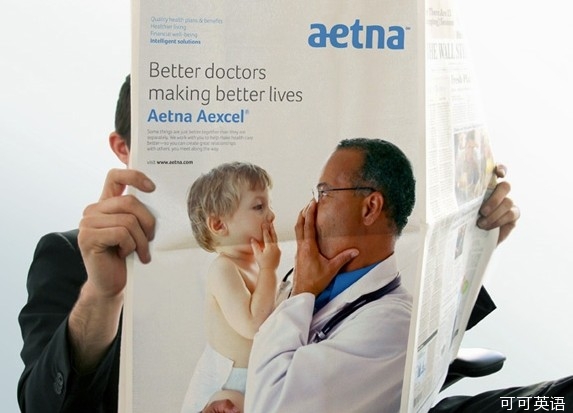(单词翻译:单击)

Business Health insurance in America The doctor octopus
商业 美国的健康保险 章鱼博士
Obamacare is making health insurers bigger
奥巴马的保健计划正在使健康保险公司变得更加庞大
THE future of Barack Obama's health law is uncertain.
奥巴马健康法案的前景还不明朗。
Its main provisions will not come into effect until 2014; the Supreme Court may strike it down before then.
其主要条款要到2014年以后才会生效;并且在生效之前也可能会被最高法院枪毙。
But America's insurers are already transforming.
尽管如此,美国的各大保险公司已经随机而动了。
They were big before; now they are growing bigger.
过去,它们很庞大,现在则正在变得更大。
On October 24th Cigna, an insurer based in Connecticut, said it would pay $3.8 billion for HealthSpring, which offers services and insurance to the elderly.
十月二十四日,坐落在康涅狄格州的保险公司Cigna声明,它将为收购HealthSpring支付38亿美元,后者的主要业务是为老年人提供服务和保险。
It is the latest deal to extend insurers' tentacles into new areas of health care.
这是Cigna公司拓展健康保险新领域的最新举动。
The question is whether they might actually improve it.
问题是它会不会真的去提高该领域的服务质量。
Good, cheap health care has long eluded America.
长期以来,美国都没有既好又便宜的卫生保健项目。
Doctors are paid for each service, so they deliver as many as possible, necessary or not.
医生的每项服务都是付费的,因此,不管有没有必要,他们都会推销尽可能多的服务项目。
Insurers protect margins by micromanaging claims and hiking premiums.
保险公司靠权利的细微调控和额外费用的大幅提高来保障利润。
These perverse incentives are addressed, faintly, by Obamacare.
奥巴马健康法案中模糊地提到要改革这些不当的动机。
For example, there are pilots to reward hospitals for the quality rather than the quantity of their care.
比如,法案中的一些导则规定,奖励那些致力于提高服务质量而不是服务数量的医院。
Mostly, however, the reform deals with the symptoms of muddled incentives: high premiums and poor access.
但是,大部分的改革内容则是针对那些让人不解的怪症,即高额的额外费用同时又难以得到的健康保健服务。
For insurers, reform holds opportunity and peril.
对于保险公司来说,改革即润育着机会同时也存在风险。
From 2014 the law will require everyone to buy health insurance and offer subsidies to those who cannot afford it.
法律规定,从2014年开始每个公民都要买健康保险,同时对于那些支付不起保险费用的公民给与补贴。
As more people buy insurance, firms' revenues will more than double to $1.2 trillion by 2019, predicts the Boston Consulting Group.
波士顿咨询公司预计,截止到2019年,当更多的人买保险之后,保险公司的收益会达到一万两千亿美元,是现在的两倍多。
However, profits will be squeezed, thanks to a new tax, a minimum standard for benefits and new scrutiny of increases in premiums.
但是,由于新税法,利润上限制度和新的监管酬金增长制度的实施,保险公司的利润将会缩减。
Faced with all this, insurers are keen to diversify.
面对这些新变化,保险公司都热衷于多样化的经营。
Many are hedging against a volatile private market by turning to the public one.
为了预防私营市场的不稳定性,许多公司转向了国营(政府经营的)市场。
More states are asking insurers to run Medicaid, the programme for the poor.
更多的州政府要求保险公司经营管理针对穷人的医疗补助项目。
HealthSpring will help Cigna tap the market for Medicare Advantage, private plans that use public money to cover the old.
HealthSpring帮助Cigna叩响了公共市场医疗保险优越性的大门,即通过私企的计划方案,来达到利用公共资金服务老年人市场的目的。
Humana, already a leader in public health programmes, has bought two Medicare firms this year (so far) and WellPoint has bought one.
已经是公共健康项目领头羊的Humana公司,今年(截至目前)已经收购了两家医疗保险公司;WellPoint公司也收购了一个。
For these insurers, Medicare Advantage gives access to baby-boomers.
对于这些保险公司来说,医疗保险优越性给它们打开了面向婴儿潮时期出生的人群。
It is also a testing ground for Mr Obama's new health "exchanges", where consumers will be able to buy health insurance from 2014.
同时,这也是奥巴马新健康"契约"的试验场,新契约规定从2014年开始消费者都将能够购买健康保险。
Both are highly regulated markets that court consumers directly.
两个业已高度规范化的市场将同时直接服务于消费者。
Insurers are spreading into new businesses. Last year Aetna bought a health information technology (IT) company.
保险公司也正在将其业务扩展的新的领域。去年Aetna公司收购了一个健康信息科技公司。
Humana recently bought a chain of clinics. Its new Medicare plans both provide care and pay for it.
Humana最近也收购了一个连锁经营的诊所,它的新型医疗保险计划是即提供健康服务项目,同时也提供支付服务费用的项目。
The thinking is that this will give Humana the means to keep more of its customers healthy.
思考一下可知,这将给Humana公司更多的手段,去保证其客户得到更多的健康服务。
Others are doing the same.
其他公司也正在做和Humana公司一样的事情。
UnitedHealth Group, the biggest health insurer, has been extending its reach for some time.
美国最大的健康保险公司,联合健康集团(UnitedHealth Group)拓展其业务已经有一段时间了。
Two non-insurance subsidiaries already account for 20% of its $94 billion annual revenue:
其两家非保险业务的子公司的营业收入已经占了其年度营业额940亿美元的20%,
OptumInsight, an IT business, and OptumHealth, which owns doctors' groups and provides services to help hospitals improve care.
这两家公司分别是OptumInsight,一家IT公司,和OptumHealth,一家拥有医生团队并且为医院提高健康服务提供支持的公司。
These ventures do not just create new revenue streams, argues Sheryl Skolnick of CRT Capital, a broker-dealer. They strengthen United's main business.
经纪公司CRT Capital的Sheryl Skolnick说,这些风投不仅仅创造了新的公司收入,它们巩固了联合健康集团的主营业务。
This is most obvious when OptumHealth buys a doctors' group.
最明显的例子是OptumHealth收购了一个医生组织。
In August it announced that it would acquire Monarch HealthCare, in California.
今年八月份,OptumHealth宣布它将收购位于加州的Monarch HealthCare。
Bart Asner, Monarch's chief executive, predicts that Optum will help his doctors be more efficient, monitor patients' conditions and keep them healthier.
Monarch的首席执行官Bart Asner预计,OptumHealth公司将会帮助他的医生更加高效,并协助医生监护病人,使病人变得更健康。
United will enjoy revenue from owning Monarch.
联合健康公司将会很高兴分享拥有Monarch公司而带来的收益。
But as one of six insurers that contracts with Monarch, it will also benefit from patients' lower costs.
但是作为与Monarch公司签订合约的六个保险公司之一,它也将会从更低的病人服务价格中"受益"。
This virtuous circle extends to hospitals that United does not own.
这种良性循环扩展到了不属于联合健康集团的医院。
Historically insurers have fought with hospitals over payments.
历史上保险公司总是在支付费用的多少上与医院开战。
But now insurers are testing pay-for-performance contracts.
但是现在,保险公司正在实验按绩效付酬的合约。
Hospitals can use Optum's services to improve their operations, creating new revenue for Optum and new savings for United's insurance business.
医院能够利用Optum的服务来提高它们自己的服务质量,这样在为Optum创造效益的同时也为联合健康集团的保险业务节省了开支。
This strategy might begin to align the insurer's interests with those of its former adversaries.
这项策略可能会开始将以前互为对手的医院的利益与保险公司的利益拉到同一条船上。


